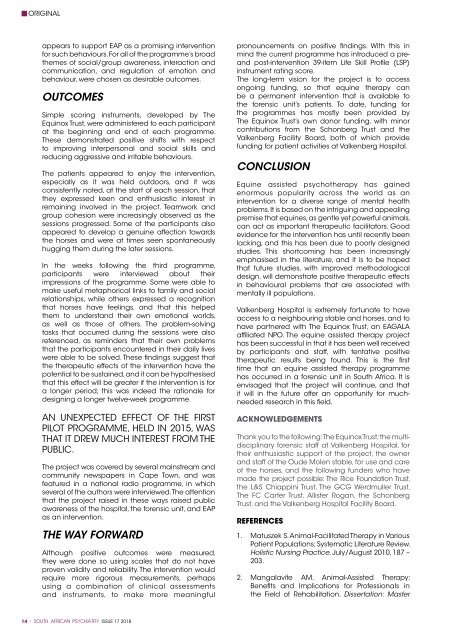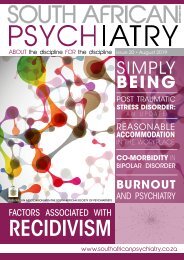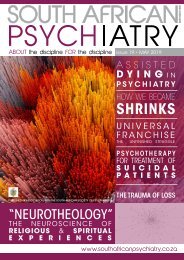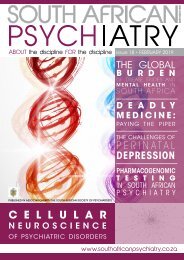South African Psychiatry - November 2018
South African Psychiatry - November 2018
South African Psychiatry - November 2018
You also want an ePaper? Increase the reach of your titles
YUMPU automatically turns print PDFs into web optimized ePapers that Google loves.
ORIGINAL<br />
appears to support EAP as a promising intervention<br />
for such behaviours. For all of the programme’s broad<br />
themes of social/group awareness, interaction and<br />
communication, and regulation of emotion and<br />
behaviour, were chosen as desirable outcomes.<br />
OUTCOMES<br />
Simple scoring instruments, developed by The<br />
Equinox Trust, were administered to each participant<br />
at the beginning and end of each programme.<br />
These demonstrated positive shifts with respect<br />
to improving interpersonal and social skills and<br />
reducing aggressive and irritable behaviours.<br />
The patients appeared to enjoy the intervention,<br />
especially as it was held outdoors, and it was<br />
consistently noted, at the start of each session, that<br />
they expressed keen and enthusiastic interest in<br />
remaining involved in the project. Teamwork and<br />
group cohesion were increasingly observed as the<br />
sessions progressed. Some of the participants also<br />
appeared to develop a genuine affection towards<br />
the horses and were at times seen spontaneously<br />
hugging them during the later sessions.<br />
In the weeks following the third programme,<br />
participants were interviewed about their<br />
impressions of the programme. Some were able to<br />
make useful metaphorical links to family and social<br />
relationships, while others expressed a recognition<br />
that horses have feelings, and that this helped<br />
them to understand their own emotional worlds,<br />
as well as those of others. The problem-solving<br />
tasks that occurred during the sessions were also<br />
referenced, as reminders that their own problems<br />
that the participants encountered in their daily lives<br />
were able to be solved. These findings suggest that<br />
the therapeutic effects of the intervention have the<br />
potential to be sustained, and it can be hypothesised<br />
that this effect will be greater if the intervention is for<br />
a longer period; this was indeed the rationale for<br />
designing a longer twelve-week programme.<br />
AN UNEXPECTED EFFECT OF THE FIRST<br />
PILOT PROGRAMME, HELD IN 2015, WAS<br />
THAT IT DREW MUCH INTEREST FROM THE<br />
PUBLIC.<br />
The project was covered by several mainstream and<br />
community newspapers in Cape Town, and was<br />
featured in a national radio programme, in which<br />
several of the authors were interviewed. The attention<br />
that the project raised in these ways raised public<br />
awareness of the hospital, the forensic unit, and EAP<br />
as an intervention.<br />
THE WAY FORWARD<br />
Although positive outcomes were measured,<br />
they were done so using scales that do not have<br />
proven validity and reliability. The intervention would<br />
require more rigorous measurements, perhaps<br />
using a combination of clinical assessments<br />
and instruments, to make more meaningful<br />
pronouncements on positive findings. With this in<br />
mind the current programme has introduced a preand<br />
post-intervention 39-item Life Skill Profile (LSP)<br />
instrument rating score.<br />
The long-term vision for the project is to access<br />
ongoing funding, so that equine therapy can<br />
be a permanent intervention that is available to<br />
the forensic unit’s patients. To date, funding for<br />
the programmes has mostly been provided by<br />
The Equinox Trust’s own donor funding, with minor<br />
contributions from the Schonberg Trust and the<br />
Valkenberg Facility Board, both of which provide<br />
funding for patient activities at Valkenberg Hospital.<br />
CONCLUSION<br />
Equine assisted psychotherapy has gained<br />
enormous popularity across the world as an<br />
intervention for a diverse range of mental health<br />
problems. It is based on the intriguing and appealing<br />
premise that equines, as gentle yet powerful animals,<br />
can act as important therapeutic facilitators. Good<br />
evidence for the intervention has until recently been<br />
lacking, and this has been due to poorly designed<br />
studies. This shortcoming has been increasingly<br />
emphasised in the literature, and it is to be hoped<br />
that future studies, with improved methodological<br />
design, will demonstrate positive therapeutic effects<br />
in behavioural problems that are associated with<br />
mentally ill populations.<br />
Valkenberg Hospital is extremely fortunate to have<br />
access to a neighbouring stable and horses, and to<br />
have partnered with The Equinox Trust, an EAGALA<br />
affiliated NPO. The equine assisted therapy project<br />
has been successful in that it has been well received<br />
by participants and staff, with tentative positive<br />
therapeutic results being found. This is the first<br />
time that an equine assisted therapy programme<br />
has occurred in a forensic unit in <strong>South</strong> Africa. It is<br />
envisaged that the project will continue, and that<br />
it will in the future offer an opportunity for muchneeded<br />
research in this field.<br />
ACKNOWLEDGEMENTS<br />
Thank you to the following: The Equinox Trust; the multidisciplinary<br />
forensic staff at Valkenberg Hospital, for<br />
their enthusiastic support of the project, the owner<br />
and staff of the Oude Molen stable, for use and care<br />
of the horses, and the following funders who have<br />
made the project possible: The Rice Foundation Trust,<br />
the L&S Chiappini Trust, The GCG Werdmuller Trust,<br />
The FC Carter Trust, Allister Rogan, the Schonberg<br />
Trust, and the Valkenberg Hospital Facility Board.<br />
REFERENCES<br />
1. Matuszek S. Animal-Facilitated Therapy in Various<br />
Patient Populations; Systematic Literature Review.<br />
Holistic Nursing Practice, July/August 2010, 187 –<br />
203.<br />
2. Mangalavite AM. Animal-Assisted Therapy:<br />
Benefits and Implications for Professionals in<br />
the Field of Rehabilitation. Dissertation: Master<br />
14 * SOUTH AFRICAN PSYCHIATRY ISSUE 17 <strong>2018</strong>

















